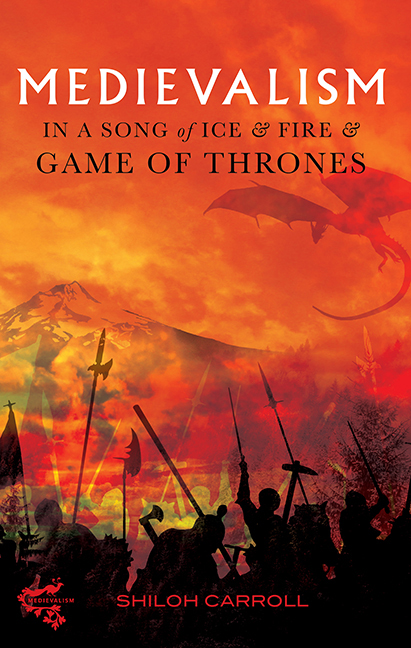Book contents
- Frontmatter
- Contents
- Acknowledgements
- Author's Note
- Introduction: Martin and Medievalist Fantasy
- 1 Chivalric Romance and Anti-Romance
- 2 Masculinity, Femininity, and Gender Relations
- 3 Sex and Sexuality
- 4 Postcolonialism, Slavery, and the Great White Hope
- 5 Adaptation and Reception
- Afterword: “Fantasy for people who hate fantasy”
- Bibliography
- Index
- Medievalism
1 - Chivalric Romance and Anti-Romance
Published online by Cambridge University Press: 09 October 2019
- Frontmatter
- Contents
- Acknowledgements
- Author's Note
- Introduction: Martin and Medievalist Fantasy
- 1 Chivalric Romance and Anti-Romance
- 2 Masculinity, Femininity, and Gender Relations
- 3 Sex and Sexuality
- 4 Postcolonialism, Slavery, and the Great White Hope
- 5 Adaptation and Reception
- Afterword: “Fantasy for people who hate fantasy”
- Bibliography
- Index
- Medievalism
Summary
FANTASY LITERATURE IS in some ways a direct descendent of medieval romance, though it picked up influences from various genres and ideologies on its way to the late twentieth century, when George R.R. Martin began writing A Song of Ice and Fire. Authors such as William Morris, Lord Dunsany, and E.R. Eddison purposefully reached back for romance influences, especially “saga literature, Arthurian legend, Old French romances, Anglo-Saxon philology, utopian visions, and vigorous medieval and gothic scholarship.” These influences help to explain why fantasy is so often set in a medievalist or neomedieval world. Also, as Kim Selling points out, the Middle Ages are “comfortable” for readers; myth and fairy tale have had a profound enough influence on Western culture that the neomedieval vision of the Middle Ages is familiar, yet different enough and far enough away for readers to believe that fantastic things could happen there and then. In Raymond Thompson's comparative study of medieval romance and fantasy literature, he points out several clear parallels between the genres: both highlight the chivalric virtues of the heroes; both have adventures meant to encourage the hero to discover his own inner strength; both require the hero's virtues – “prowess, courage, loyalty, courtesy, and wisdom” – to be proven; and both set their stories in the past or a secondary world that is “representative rather than realistic.” Perhaps it is because of this link between fantasy and romance that some today think of medieval romance as shallow and escapist, full of knights in shining armor who always live up to the greatest ideals of chivalry and protect women, children, and the innocent. This viewpoint is not limited to non-academic readers, either; W.R.J. Barron claims that romance is idealistic, portraying the world as it could be if people would strive to their highest potential. He also points out the link between fantasy and romance, especially in plot structure and motif; fantasy, he argues, contains such romance motifs as:
[T]he court gathered around an archetypal feudal monarch in embodiment of chivalric values, the challenge to those values which its reputation provoked, the solitary quest of its representative along forest pathways to answer that challenge, the temptations which beset him in welcoming wayside castles, the lovely woman wooed and won among a maze of adventures, the eventual victory in combat against the challenger and eventual return to court.
- Type
- Chapter
- Information
- Publisher: Boydell & BrewerPrint publication year: 2018



